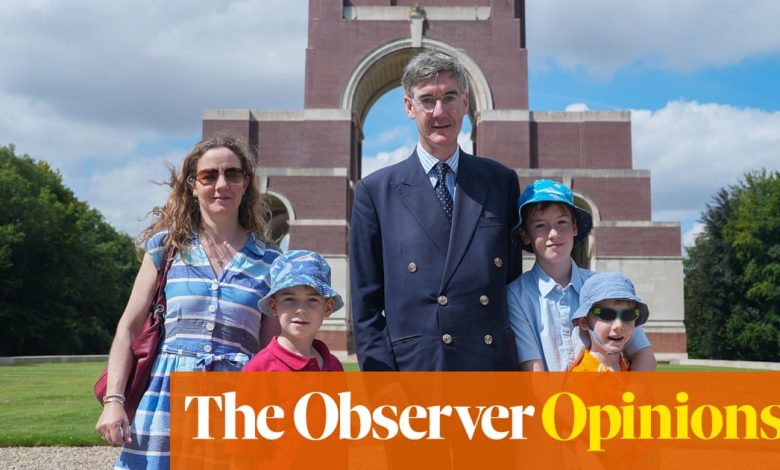Given the sharenting, let’s hope the little Rees-Moggs inherit papa’s exhibitionism | Catherine Bennett

When fertility rates in the UK have fallen below replacement levels, prolonged domestic exposure to Jacob Rees-Mogg and his six children may not be very helpful in turning things around.
As sincere a Catholic and TV presenter as he is, on GBNews, where he urges viewers to follow his example, he can reflect on how the spectacle of his younger children squirming and showing off can unwittingly double – as an extremely strong disincentive to parenthood – like contraception. Something for Rees-Mogg to consider at his next confession.
As for his children: not since Here it is Honey Boo Booseries from 2012, in which the same unremarkable American family monetizes their home life for two years, parents and program makers advertise such indifference to the interests of extremely young performers, whose participation is crucial to the show. Publicizing the seriesThe Rees-Moggs indicated that their off-camera bathrooms are considered more private by their children. Without Sixtus, Alfred, Anselm and others, the new series would hardly have progressed on Rees-Mogg’s earlier ventures of self-promotion, after the financier-turned-MP found he had an audience who paid for his eccentricities. Or not, unless he risked being questioned about topics like Donald Trump, wind farms, Rwanda or Boris Johnson, which could undermine his performance in this series as primarily stupid.
The addition of his dumb wife, dumb servants and six theoretically dumb children are what distinguish Rees-Mogg’s new pilgrimage, which follows his recent political departure, from the previous emphasis on his nanny, cars and addictions. Even with their participation alternating between scenes of Rees-Mogg, driving around Somerset and dragging out various platitudes, the program’s creators are clearly struggling with the fact that their character is already predictable and, at worst, boring, even more than his wife at school.
On Election Day, the production team, blindsided or desperate, looks for variety in Sixtus opening his birthday presents (the shopping trip to buy them is exhaustively detailed), playing with them, blowing out candles, and finally goes to bed The fact that these inconspicuous activities take place in semi-baronial settings really lends something of a stamp that might be unique in reality television, had the royal family not long ago ventured into the same territory. The exposure of young Rees-Moggs in favor of their father differs only in degree from the royal exposure of children, also too young to give informed consent, most recently in the short film in which the Welles family is professionally filmed walking on meadows. Another performance is coming up at their mother’s annual Christmas service, where they traditionally appear Railway children clothes and carry candles.
The creators of Meet the Rees-Moggs family might have been entitled to expect that his offer of a baronetcy and candlelit suppers plus the condescending opinion that he was “MP for the 18th century”, would provide the kind of informal protection that has spared royalty and would-be practitioners, Boris and Mrs Johnsonthe kind of accusations leveled at less gracious sharers like Katie Price, the Beckhams, the Kardashians, Gwyneth Paltrow. After Paltrow shared a picture of skiing in 2019 with her 5.4 million followers on Instagram, her daughter commented: “Mom, we have discussed this. You may not post anything without my consent. Paltrow: “You can’t even see your face!”
The resulting debate over parental distribution of images to children awaits research confirming the risk that children may feel uncomfortable and embarrassed by this irreversible loss of privacy. “Sharing syndrome“, says one study, “may be considered a form of child abuse and neglect, similar to Munchausen syndrome by proxy.”
after the promotion of the newsletter
In the case of the Rees-Mogg TV series, the audience not only sees the children’s faces, but enjoys long sequences of them behaving in ways that, like many other things in the life of a Rees-Mogg parent, would horrify through every century, not just the 18th. If his boys are shown as unlikable, it’s probably because older Moggfluencers happily signed up to it, and the show’s creators are strangely confident, for their part, about the ethics of featuring teenagers and under ten, even with parental consent . For whatever that’s worth the kind of parents who are happy to say on camera, “Don’t tell anyone else, but Alfred might be our smartest kid.”
With luck, anyway, the documentary makers will have scattered if they ever had grown-up Rees-Mogg questions, like some participants in the ITV original Seven-Up!, the way they were used. “I feel like there are aspects of this where I feel very, very humiliated by these things that I’ve said in the past,” said Susie Lusk, regretting some of the things she was askedaged seven, by the late Michael Apted. Not that she ever boasted, as a Rees-Mogg child, “we’ve got a mansion.” To be fair to the Rees-Mogg filmmakers, their respect seems entirely sincere. “What’s it like to be a Rees-Mogg?” “How would you describe your father?”
How easily Sixtus and the siblings cope now and in the future with their exposure probably depends, as with royalty, on how effectively Rees-Mogg instilled in them his core values: exhibitionism, snobbery, entitlement, ostentatious piety. Whatever its flaws, the series will be instructive for any parent or cult member interested in learning from an acknowledged master how to clone themselves. Rees-Mogg senior asks his sons if they want to become MPs, teaches tributes to Boris and Kerry, offers religious instruction at the table, appoints them as altar servers at a quaint private chapel, where he shows off his collection of reliquaries, possibly a reality TV first TV: “This is a little thorn in the crown of thorns.”
If he shows little concern for the excessive veneration of relics, this unfortunate weakness is ultimately the only reason this series was commissioned.


